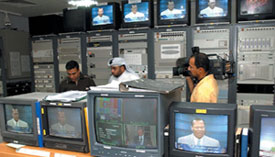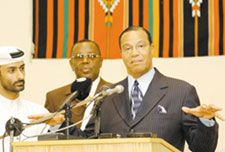- Sheikh Yassin: Hamas still committed to truce (Al Bawaba)
- Minister Louis Farrakhan’s Peace Mission Report (FCN, 07.22.2002)
- Nation of Islam leader offers his vision for Middle East peace (FCN, 06.26.2002)
Farrakhan initiative accepted one year later

UNITED NATIONS (FinalCall.com)–Almost one year to the day after the Honorable Minister Louis Farrakhan proffered a plan to get the peace process moving between Palestinians and Israelis, that plan has been initiated by Israeli Prime Minister Ariel Sharon, Palestinian Prime Minister Mahmoud Abbas and the Bush administration.
Those parties announced a deal that includes a ceasefire agreement and a pull-back of Israeli troops from the Occupied Territories, as well as beginning the dismantling of Israeli settlements in those areas. Palestinian groups such as Hamas, al-Fatah and Islamic Jihad have signed on to the agreement.
Under the withdrawal plan, Israel would also cease military incursions and dismantle checkpoints, which have paralyzed Palestinian life in Gaza. In return, the Palestinian Authority must take security responsibilities and crack down on militant groups, ensuring that attacks against Israeli targets would stop. Israel also has been asked to release some Palestinian prisoners.
“All factions are in full agreement on the truce itself, but some of the groups voice some differences on political issues,” Ahmed Ghneim, a senior Fatah official told Reuters. At Final Call press time, the militant group Al Aqsa Martyrs Brigade, which did not sign on to the agreement, claimed responsibility for the shooting death of a Romanian truck driver in the West Bank, one day after the start of the ceasefire.
Israeli officials expressed doubts about the ceasefire and insisted the Palestinian Authority must disarm the “militants.”
“We are not holding our breath,” Israeli Foreign Ministry official Gideon Meir said.
Officials with the Bush administration said they also welcomed the news of the ceasefire, but want to see more progress. A “road map” for peace was agreed to, in principle, on June 4, 2003 in Aqaba, Jordan, after meetings between Pres. Bush, Prime Minister Sharon and Prime Minister Abbas.
Sources in Washington said the administration backs Israel’s call for Mr. Abbas to dismantle the organizations that have responded violently to Israeli occupation of Palestinian land. But Palestinian officials say they fear such an action could spark civil war.
U.S. State Department spokesman Richard Boucher said a truce would be a useful “first step” toward peace. According to press reports, Pres. Bush reacted to news of the ceasefire by saying: “I’ll believe it when I see it É in order for there to be peace in the Middle East, we must see organizations such as Hamas dismantled.”
The first step of the “road map” peace plan called for the ceasefire and Israeli withdrawal from Gaza and West Bank cities occupied by their army during the 33-months of fighting that caused the deaths of 2,414 Palestinians and 806 Israelis, and the dismantling of illegal Jewish settlements in Palestinian territory. All of this was to be completed by May 2003. The “road map” calls for a Palestinian state with secure borders by 2005.
Farrakhan’s proposal

Last year, during a time when the Bush administration had its anti-Iraq propaganda in high gear and an attack on that nation was clearly imminent, Min. Farrakhan led a small delegation of Nation of Islam officials and Christian and Muslim clergy to the Middle East and Africa. The purpose of the peace mission was two-fold: to stop the bloodletting in Palestine/Israel and to avoid a U.S. attack on Iraq.
During his various media appearances, the Muslim leader from America–who is very popular in Africa and the Middle East–called for a 90-120 day moratorium on suicide bombings and other attacks by freedom fighters that take civilian lives, as well as a cessation of the building of a wall on the West Bank border to separate Israelis from Palestinians.
“If I am permitted to go in, I don’t care how dangerous it is–I am totally unafraid of the danger, because I believe, if I go, Allah (God) will go with me,” Min. Farrakhan said on the Al Jazeerah network, watched closely by the Muslim world and monitored by the U.S. government.
“Allah will help me to help them to help themselves. I believe I can speak to Ariel Sharon, even as Musa (Moses) spoke to Pharaoh. Sincere, committed men of God can reach other hearts that appear to be hardened. But I believe Ariel Sharon wants a way out of this violence, and so does President Arafat, and so does Hamas, and so does the world, because if this doesn’t stop, it could engulf the whole region and engulf the whole world. So this is the best and the most opportune time for people of good will to step in and try and solve the problem,” he said.
To the disappointment of the delegation, the Israeli government rejected Min. Farrakhan’s request to enter the country.
Sheikh Ahmed Tijani Ben-Omar, a member of Min. Farrakhan’s delegation, told The Final Call that the contents of the “road map” and ceasefire are exactly what Min. Farrakhan was calling for during his first appearance on a Middle East news program.
“As a matter of fact, when the Minister was conducting the very first interview in Qatar, which was the first place of our visit, with the famous anchorman with Al Jazeerah, what is going on, as far as the peace initiative now, is exactly what the Minister proposed.
“And this was advocated and recognized by the president of Syria. As soon as we arrived, President Bashar Assad said to the Minister that he had heard everything, all proposals, but he was very optimistic that the only solution to the Middle Eastern problem is the proposal of the Minister, which he witnessed on the Al Jazeerah satellite.
Nation of Islam Chief of Staff Leonard F. Muhammad, who also was part of the delegation, said the U.S. government and the Israelis missed a golden opportunity to save many lives by shutting their minds and ears to the Minister’s proposal.
“Perhaps it would have taken root, even then,” Mr. Muhammad said of the Minister’s call for a ceasefire. “We had said all along that Min. Farrakhan should be utilized in this matter” because of the credibility he has as an “honest broker” in the region, he said.
Stumbling blocks
Unlike the Bush administration, a United Nations spokesman for Secretary-General Kofi Annan voiced more optimism in welcoming the ceasefire news. “We look forward to continued implementation on the road map, leading to a permanent settlement of the conflict,” Mr. Annan said in a prepared statement.
“Minister Farrakhan is well respected by the Palestinian people,” several Arab reporters assigned to the UN told The Final Call. “The stumbling block has been the Israeli government and its army.”
Analyst Naseer Aruri, author of “Dishonest Broker: The U.S. Role in Israel and Palestine,” says the ceasefire and road map are doomed to fail, because there is no real honest broker mediating the peace plan.
“Ten years after Oslo, the sole conciliator and self-labeled ‘honest broker’ is out again with a peace plan called the ‘road map’–a sound bite rather than a workable plan. The impassable threshold of requirements and facts on the ground such as suffocating settlements, bypass roads, a devastated Palestinian economy, Palestinian Authority institutions lying in ruin and the so-called ‘Separation Wall’ will insure its failure,” he said of the Bush plan.
Leonard Muhammad also voiced concern that if the ceasefire appears to hold for a while, there’s always the possibility of sabotage by Israeli interest groups who don’t want peace.
He was referring to the July 2002 Israeli bombing of a Palestinian home where militant leaders were meeting to discuss a ceasefire plan at that time–even as Min. Farrakhan was in the region but not allowed to visit Israel. The bombing put an end to all talks of a ceasefire.
U.S. National Security Adviser Condoleezza Rice, during her recent June 29 meeting in Israel, criticized the building of the Israeli security wall around parts of the West Bank, saying it could prejudice further negotiations over a secure border for the Palestinians.
Ismail Abu Shanab, one of five Hamas leaders, has said that ultimately Hamas might be willing to accept a two-state solution to the Palestinian/Israeli conflict in the short term. Until now the public position of Hamas has been that it will continue fighting until Israel is destroyed. “When we build a Palestinian state,” Mr. Abu Shanab told the Jerusalem Post, “we will not need these militias. Everything will change into a civil life.”
Mr. Abu Shanab said his pragmatic view does not mean that Hamas will give up its claim to what is now Israel, but Hamas is willing to leave the claim to future generations. He said the ceasefire could continue for decades until Palestinians judge the time is right to pursue their claims to all the former British-mandated Palestine.
Minister Farrakhan, in his effort to bring peace to the troubled region, follows in the footsteps of others such as Dr. Ralph Bunche, who after 11 months of acting as a mediator for the UN in 1948, finally got Israel and Arab leaders to sign an armistice agreement. For his efforts, Dr. Bunche was honored in 1950 with the Nobel Peace Prize.












